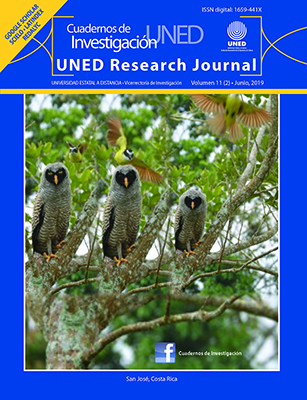How to obtain the maximum benefit from scientific research funds: the example of Costa Rica (achievements and challenges, FEES 2006-2016)
DOI:
https://doi.org/10.22458/urj.v11i2.2309Keywords:
fund distribution, research and development, women in science, science for underserved communities, academic cooperation in the tropics, impact of science, CONARE.Abstract
Introduction: Costa Rica is the country with the most developed scientific community in Central America. In 2005, Costa Rican public universities, coordinated by a Council of Public Universities (CONARE), decided that, instead of working in isolation, they would pool resources. These financed joint research to solve environmental problems and support groups in disadvantage, like women and minorities. Objective: to examine the results after the first ten years of the program with emphasis on who received the funds and what products were obtained. Methods: we surveyed project coordinators and obtained replies from about half of them (i.e. the coordinators of 71 projects answered). Results: We found that 60% of research funds benefited disadvantaged populations (i.e. those in coastal and border areas) and that 54% of researchers who received funds were female. Survey projects produced 1388 scientific articles and 883 practical products, such as community workshops and commercial start-ups (estimate: over 2700 articles and 1700 practical products for the whole set of projects). Conclusion: These projects have been highly productive, have benefited women and underserved communities, led to lasting collaboration among researchers from different institutions, and are an example for other small countries with limited research funds.
References
Ballantyne, A. J. (2010). How to do research fairly in an unjust world. The American Journal of Bioethics, 10(6), 26-35. DOI: 10.1080/15265161.2010.482629
Brenes-Bonilla, L. (2018). Investigación y Posgrado en América Central y República Dominicana. (Informe técnico). San José, Costa Rica: Consejo de Investigación del Sistema Centroamericano de Investigación y Posgrado.
Brenes-Bonilla, L., Bermúdez-Mesén, L., & Bermúdez-Vargas, K. (2015). SME´s semi-formality rate in Costa Rica: a clusters approach. Faedpyme International Review, 4(7), 47-52. DOI:10.15558/fir.v4i7.98
Cislak, A., Formanowicz, M., & Saguy, T. (2018). Bias against research on gender bias. Scientometrics, 115(1), 189-200. DOI:10.1007/s11192-018-2667-0
CONARE (Consejo Nacional de Rectores). (2018). Cuarto Informe de Ejecución Presupuestaria. San José, Costa Rica: Consejo Nacional de Rectores.
Ellis, T. J., & Levy, Y. (2008). Framework of problem-based research: A guide for novice researchers on the development of a research-worthy problem. Informing Science: the International Journal of an Emerging Transdiscipline, 11, 17-34.
Emanuel, E. J., Wendler, D., Killen, J., & Grady, C. (2004). What makes clinical research in developing countries ethical? The benchmarks of ethical research. The Journal of infectious diseases, 189(5), 930-937. DOI: 10.1086/381709
Farago, J. (2018, 26 de julio). Mushrooms, Magma and Love in a Time of Science. The New York Times, pp. C11.
Jiménez-Medina, J. A. (2014). Publicar o morir: divulgación de conocimiento en el campo editorial universitario, el caso colombiano. Dialéctica Libertadora, 6, 122-136.
Monge-Nájera, J. (2011). Darwin y su poco impacto en las ciencias sociales costarricenses. Cuadernos de Antropología, 21, 1-6.
Monge-Nájera, J., & Ho, Y. S. (2012). Costa Rica Publications in the Science Citation Index Expanded: A bibliometric analysis for 1981-2010. Revista de Biología Tropical, 60(4), 1649-1661. DOI: 10.15517/rbt.v60i4.2158
Monge-Nájera, J., & Ho, Y. S. (2016). Bibliometry of Panama publications in the Science Citation Index Expanded: publication type, language, fields, authors and institutions. Revista de Biología Tropical, 63(4), 1255-1266. DOI: 10.15517/rbt.v63i4.21112
Monge-Nájera, J., & Ho, Y. S. (2017a). Bibliometrics of Nicaraguan publications in the Science Citation Index Expanded. Revista de Biología Tropical, 65(2), 643-655. DOI: 10.15517/rbt.v65i2.23985.
Monge-Nájera, J., & Ho, Y. S. (2017b). Honduras publications in the Science Citation Index Expanded: institutions, fields and authors. Revista de Biología Tropical, 65(2), 657-668. DOI: 10.15517/rbt.v65i2.25893
Monge-Nájera, J., & Ho, Y. S. (2017c). El Salvador publications in the Science Citation Index Expanded: subjects, authorship, collaboration and citation patterns. Revista de Biología Tropical, 65(4), 1428-1436. DOI: 10.15517/rbt.v65i4.28397
Monge-Nájera, J., & Ho, Y. S. (2018). Guatemala articles in the Science Citation Index Expanded: bibliometry of subjects, collaboration, institutions and authors. Revista de Biología Tropical, 66(1), 312-320. DOI: 10.15517/rbt.v66i1.29875.
Russell, J. M., Ainsworth, S., del Río, J. A., Narváez-Berthelemot, N., & Cortés González, H. D. (2007). Colaboración científica entre países de la región latinoamericana. Revista Española de Documentación Científica, 30(2), 180-198.
Umaña, P., & Vargas, L. (2018, 10 de agosto). La participación de las mujeres continúa relegada en las ciencias. Noticias UCR. Recuperado de www.ucr.ac.cr/noticias/2018/08/10/la-participacion-de-las-mujerescontinuarelegadaen-las-ciencias.html.
Additional Files
Published
How to Cite
Issue
Section
License
Note: This abstract contains an incorrect copyright due to technical issues. Authors who publish with this journal agree to the following terms: Authors retain copyright and grant the journal right of first publication with the work simultaneously licensed under a Creative Commons Attribution License that allows others to share the work with an acknowledgement of the work's authorship and initial publication in this journal
All journal contents are freely available through a CC BY 4.0 license.
CC BY 4.0 is a Creative Commons: you can copy, modify, distribute, and perform, even for commercial reasons, without asking permission, if you give appropriate credit.
Contents can be reproduced if the source and copyright are acknowledged according to the Open Access license CC BY 4.0. Self-storage in preprint servers and repositories is allowed for all versions. We encourage authors to publish raw data and data logs in public repositories and to include the links with all drafts so that reviewers and readers can consult them at any time.
The journal is financed by public funds via Universidad Estatal a Distancia and editorial independence and ethical compliance are guaranteed by the Board of Editors, UNED. We do not publish paid ads or receive funds from companies.
